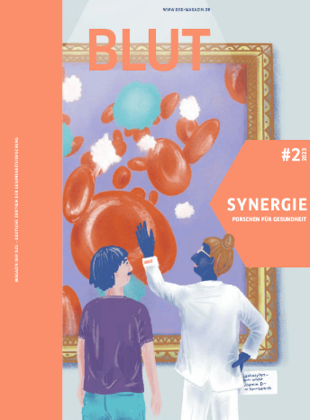Blood performs many important functions in the human body, from supplying oxygen to balancing body temperature. It is a medium for medicines and provides important insights into the body, making it possible to diagnose diseases and monitor and optimize therapies. The DZG work on a wide range of questions where blood helps to find the answers.
In the "blood count" you can see the number and type of cells in the fluid, it can help to detect anemia, infection, diabetes or blood diseases. Our blood can tell us a lot about our bodies. If certain enzyme levels are elevated, it may indicate liver or kidney problems. Imbalances in electrolytes or minerals indicate kidney disease or hormone imbalances. If proteins such as troponin are elevated, this may indicate heart problems; elevated cholesterol and triglyceride levels increase the risk of heart attack and stroke. Infections with HIV, hepatitis viruses, SARS-CoV-2, West Nile virus, and other disease-causing viruses, bacteria, and parasites can also be detected in the blood, as can proteins that indicate brain disease.
DZG Magazine SYNERGIE
Research for health – under this motto, the German Centers for Health Research (DZG) report twice a year on projects and achievements in translational research in the DZG magazine SYNERGIE (in German). The magazine for health research shows how interdisciplinary and networked research can help people achieve better health. The magazine is published in a print and an online version (https://dzg-magazin.de). – to subscription
Alternatively, you can find the current issue here in the e-reader. (in German)
The German Centers for Health Research (DZG)
The goal of the German Centers for Health Research is translational research: the accelerated development of medical innovations. On the initiative of the German Federal Ministry of Education and Research, six centers were founded between 2009 and 2011 to better understand the causes of widespread diseases and to transfer research results from the laboratory to practice more quickly. The centers are dedicated to the following diseases: Cancer (DKTK), neurodegenerative diseases (DZNE), infectious diseases (DZIF), diabetes (DZD), lung diseases (DZL) and cardiovascular diseases (DZHK).
To this end, a total of 36 medical faculties and university hospitals work together with around 90 non-university institutes of the Helmholtz Association, the Leibniz Association, the Max Planck Society, the Fraunhofer Society and departmental research institutes of the federal government. Furthermore, there are collaborations with scientists in Germany and internationally.

